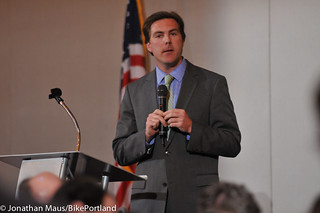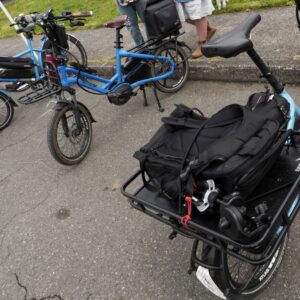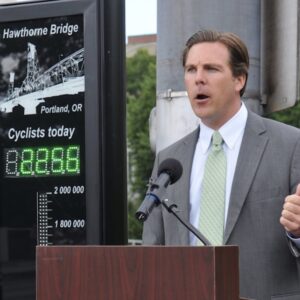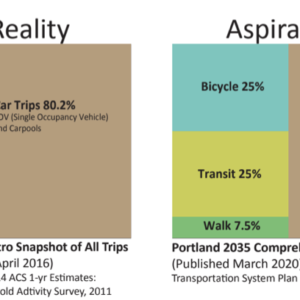During a speech at the Oregon Active Transportation Summit in Salem yesterday, PBOT Director Tom Miller got advocates up to speed on the funding crisis at the agency and organizational changes they’ve made that could reap benefits for bicycling. In addition, Miller made the unexpected announcement that PBOT will soon roll out a formal 10% bike mode split goal, a step in accountability he says is unprecedented.
Miller said PBOT is being forced to adapt and change due to a “crisis in transportation” that revolves around funding. He said Portland has a 21st century transportation vision they are trying to carry out with a 20th century funding model.
“Therein lies the challenge,” he explained. “We know what we want to be doing, we know how to do it, and we are well on our way, we just lack the funding stability.”
“We’re going to tell you how we’re going to get there [to 10% bike use]. That’s new. PBOT’s never done that before.”
— Tom Miller
The problem is (as many of you already know) an over-reliance on state gas tax revenue. But not everyone believes that line. Perhaps answering to critics that say PBOT is to blame for its financial problems because they committed to major expenditures (like the Sellwood Bridge, sidewalks, and the Portland-Milwaukie light rail project) whose bills are now coming due, Miller explained they based those decisions on ODOT projections that are vastly lower than expected.
ODOT raised the gas tax six cents per gallon in 2009 (the first increase since 1993). After doing so, they estimated the City of Portland would bring in about $300 million in new revenue. But in 2011, Miller explained, “the numbers came back at $174 million — 58% of what was anticipated.”
“That over-reliance of gas tax revenue is exacerbated in Portland,” Miller continued, “because we’ve been successful in what we’re trying to do [getting people to drive less].”
In response to this new funding reality, Miller says PBOT is “making some fundamental changes to how we do business to right-size expenditures with revenue projections.”
“Council has told us they want to create conditions for 25% bike mode share… This is an opportunity for PBOT, community stakeholders, and council to reaffirm that commitment.”
One of those changes is to “reform” the much-heralded Transportation Options Division (the folks that do SmartTrips, Sunday Parkways, pass out bike maps, and so on). Beginning July 1 of this year (first day of PBOT’s new fiscal year), they will morph that into a new Active Transportation group that Miller hopes is, “the most effective active transportation group of any municipality in this nation.” (Read more of our reporting on these changes here.)
Miller said this new group within PBOT will lead to a “more concerted focus on bicycling and walking” and that he’s not doing it only because those are the “right modes to focus on,” but because “they are incredibly cost-effective.”
To demonstrate to the public that PBOT should focus even more on biking and walking, he said he’s working on a fact sheet that will explain the costs related to the infrastructure it takes to move a person one mile in a private motor vehicle versus the same infrastructure required to move that person one mile with a bike or on foot.
Even with data, Miller realizes any renewed approach to finding new revenue for biking at the agency will be controversial, so he said he’ll fall back on Portland’s adopted goal of 25% bike mode split by 2030. While that goal is ambitious, Miller feels that to actually achieve it, PBOT must set shorter-term goals and allow the public to track their progress.
With that, Miller announced, “We’re going to roll out a 10% mode split goal.”
Using the term, “universal accountability,” Miller said the idea is to allow the public to “hold elected leadership accountable” for progress toward the goals they’ve set.
“We’re going to tell you how we’re going to get there [to 10% bike use]. That’s new. PBOT’s never done that before.”
Along with the 10% goal, Miller says PBOT will release a fixed timeline and a scope of projects to get there. “Why am I focused on that?,” he added, “Accountability, rigor, discipline, and transparency.”
According to Miller, he wants the public — and especially bike advocates — to be able to easily track the City’s performance and hold PBOT and elected officials accountable. “If the funding is there, and you know the engineering expertise is there… The only thing we lack is political will.” With public awareness of the steps Miller wants to take to get to 10% bike mode share, he’s hoping that advocates can mobilize the community and create the political breathing space needed for what he refers to as the “tough decisions” and “tough calls that need to be made,” to successfully, “march along the path to that long-term 25% goal.”
Reached for more details today, Miller said the 10% initiative would be developed by the new Active Transportation group and that it will be rolling out later this year. Ultimately, the policy will be adopted by City Council. “Council has told us they want to create conditions for 25% bike mode share… This is an opportunity for PBOT, community stakeholders, and council to reaffirm that commitment.”
In terms of where the money will come from, Miller said PBOT will work to identify new revenue streams. Re-allocating existing revenues is not being considered.






Maybe I missed it, but did Mr. Miller provide a timeline for hitting this 10% mode share?
The “fixed timeline” Miller references in the story is to be determined. It will be released when the 10% initiative is formalized and released by the new Active Trans group, which Miller said will happen “this calendar year.”
stay tuned!
Take that Ms. Slovic!
…not doing it only because those are the “right modes to focus on,” but because “they are incredibly cost-effective.”
Best news I’ve heard in a long while from a transportation official.
Thanks so much for your excellent reporting, Jonathan.
This sounds quite promising.
My perspective of Government typically isn’t to get upset when mistakes get made. We’re human, we learn new things, public perception changes, etc. etc.
However, what really gets under my skin is when Government doesn’t admit there is a problem and isn’t nimble enough to change course. Reading this was refreshing and makes me feel optimistic for our city.
Bike mode split from 6 to 10% ? Peanuts.
The bike mode split does not matter.
What really matters is the non-somv commuter mode split.
We should be shooting for 75%.
It’s interesting that the gas tax is so hard to raise.
Is it pushback from the transportation industry, such as trucking firms, cab drivers, etc.? Or is it outrage from individuals?
I just don’t understand why it is politically so hard to raise it. Make it something like a 2 cent a year automatic increase, and no one will feel it. Better than big jumps once every 15 years.
With what I drove last year, an additional 2 cents would cost me an increase of just about $10.00 over the course of the year. That is peanuts, especially given that gas costs nearly $4.00 a gallon now. Even the most cash-strapped person who drives could afford that.
ODOT & PDOT complain that the gas tax isn’t keeping up. Really? I bet if we had a “realistic cost” gas tax like Europe at $3.50 a gallon there would be no shortage of transportation money. It’s the gas tax backlash that politicians are afraid of, I think they all know it has to be raised.
Hear, hear. Maybe the politicians are afraid of discovering they don’t have any backbone?
Suppose they gave a war and nobody came?
Suppose they raised the gas tax and nobody voted that politician out of office?
Or perhaps adjust the gas tax up or down quarterly (or monthly!) based on what is required to match the revenue needed (for approved maintenance) for the following period. In this manner, it (gas tax) would be adjusted to match the previous and projected short term trends in ridership of public transporation (which is what we want), increases in gas mileage (which is also what we want), and fewer drivers; as boomers begin to retire in droves (which is what we’ve inherited). If only we had a crystal ball for gas use and Salem could work that fast (sigh).
Last time the voters voted on a gas tax increase (in May 2000), voters turned it down 88-12%.
Hence, legislators are loathe to pass something that’s incredibly unpopular, especially if it doesn’t meet the needs of interests who have enough funds to refer the measure to the people (a double-whammy of not getting what you want and reminding voters that you supported something they don’t like).
Talk to the average voter and they’ll likely think that there’s a lot of waste in the transportation funding world, and the problem isn’t a lack of money but a wasteful pattern of spending it. And it’s easy to find anecdotal evidence of waste, like, um, the $4,000,000,000+ CRC mega-highway.
Interesting polling numbers, Evan. And yet it was raised in 2009. How to explain that? Perhaps the poll question was worded poorly? Perhaps explicitly referencing inflation, highway maintenance costs, etc. in such a future question would yield different results.
No matter what the specific shortcomings of the past, our approach to taxing fuel in this country and state and town is obsolete and ruinous.
If it takes an education campaign to explain to voters how the tax is inadequate, demonstrate accountability in spending, or whatever, this is an issue that we could use some bold leadership on.
To be clear, the 2000 numbers aren’t poll numbers – they’re election numbers. I haven’t seen a way to phrase gas tax increases to make them palatable (though I agree with the arguments, most voters don’t).
The 2009 gas tax package was very interesting. What happened is they included very specific earmarks to get specific legislative votes. A general gas tax increase wouldn’t have passed. So unlike the general agreement through Oregon history (legislature raises money, OTC and ODOT have a process to select projects), the legislature created a pork package with specific projects.
When the package came down, who came to testify? ADEC, a major conservative donor, who was excited about the $100+ million for Newberg-Dundee bypass. Who else benefited? A big highway in Southern Oregon near Jeld-Wen, another major conservative donor.
And they promised Portland democrats that none of the funding would go to the CRC mega-highway. So they managed to get the votes of conservatives who got highways in their districts, highways that benefit major anti-tax donors who would otherwise fund a referendum, and democratic votes from those who know we need more funding overall.
The environmentalists chose not to spend $400,000 or so needed to refer it to the ballot, and ended up getting a bill connecting global warming and transportation investments, whose implementation we’re just seeing now.
My two cents on what happened. If anyone had taken it to the ballot, voters would have voted it down in a landslide.
Fascinating (and creepy). Thanks for that background, Evan.
Also funny/tragic how this matter is handled so much better in most other overdeveloped countries.
What mode split are we at now?
5%-7%, depending on whose numbers you believe. A 10% mode share represents at least 50% growth over current numbers. I’d like to see that happen, and if Adams’ successor (and the new council) will let PBOT keep moving in this direction after the elections.
The fact sheet explaining the cost infrastructure to move a person one mile should be rather powerful data. Excited to see that.
This thread is a reminder that Tom Miller is truly dedicated to our issues and understands the benefits of walking and biking investments.
There are two candidates for mayor who’ve said they would kick him out, despite not having a chance to work with him and evaluate him while in office.
http://bikeportland.org/2012/03/16/pbot-director-miller-responds-to-mayoral-candidates-calling-for-his-ouster-68989
The third is Jefferson Smith, the endorsed candidate of Bike Walk Vote. There’s a huge canvass Earth Day, this Sunday April 22nd, for Jefferson. Meet at Crank bicycles at noon. Questions – Contact Rachel at 971.570.1161 or rachel -at- jeffersonsmith.com
Wow, Jonathan, looks like you had to sit through quite a session of political platitudes and doublespeak:
“We’re going to roll out a 10% mode split goal.”
“universal accountability,”
“tough decisions” and “tough calls that need to be made,”
and the best for last…
“Accountability, rigor, discipline, and transparency.”
Ouch. These guys are pros at saying a lot of words that mean very little and promise even less. Did you feel like he was just a lackey sent by his superiors to sort of placate those of you at the conference?
If I didn’t know Tom and didn’t have any background on him, I might think this was politi-speak. But I think he’s actually saying something substantive here… If it actually comes to fruition, it will be a much more acccountable and transparent approach than PBOT has ever taken. They will be essentially, not just dreaming of a vision decades from now with no public accountability for steps it takes to get there — they will publish a specific date, a goal (10%), and a list of projects to get there.
Tom can explain it however he wants (and btw it’s pretty typical for folks in his position to talk like that), but that’s what’s going on and if you think that lacks substance i disagree with you.
Also, he is clearly making the case that, because of a lack of money, he intends to put a higher priority on biking and walking than they currently have. To me, that doesn’t “mean very little” at all.
Over reliance on the gas tax is a common claim, but it turns out to be untrue – at least in terms of the Oregon Department of Transportation’s budget.
According to the 2011 – 2013 Legislatively Adopted budget, “motor fuel taxes” account for about 20 of the total budget. It is the largest single revenue item at $1.1 billion. It’s followed by federal funds at $0.9 billion; driver and vehicle license fees at $0.7 billion; and weight-mile revenues at $0.6 billion.
A two-page budget summary with very nice charts can be found at:
http://www.oregon.gov/ODOT/CS/FS/docs/budget/11-13LABRevSourcesandUses.pdf
I have long advocated a big increase in gas taxes – add 50 cents per gallon per year for the next ten years. That would make those driving motor vehicles pay their fair share and would encourage all of us to drive less and choose more efficient cars when we do buy and operate them.
Could it be that the across the board fuel efficiency of newer cars and the future targets for fuel efficiency are really what is responsible for the lower gas tax revenues? I say drive as much as you want, just do it in a car that has better technology.
Share the road. Share the rules.
short answer: no.
You inadvertently demonstrated why this won’t work.
“I say drive as much as you want, just do it in a car that has better technology.”
That is pretty much what has happened over the past almost forty years in the US. What is new to this conversation about oil and our future on this planet is that we are beginning to realize that the remaining oil and coal and natural gas really should stay in the ground; that we can’t afford to dig it up and burn it in our cars and power plants. As such fuel efficiency is arguably beside the point. All that does is affect the rate at which we burn what’s left ~ whether in five or 25 or 50 years doesn’t make much of a difference, environmentally speaking.
No. Fuel efficiency of the US motor vehicle fleet is basically unchanged in the last 25 years. Autos are slightly more efficient, but SUVs and light trucks not comprise more than half the fleet, so the overall efficiency is the same. The technology has been used to increase performance. Horsepower has almost doubled and fuel economy has stayed constant.
See the summary from the Pew Center at:
http://www.pewenvironment.org/uploadedFiles/PEG/Publications/Fact_Sheet/History%20of%20Fuel%20Economy.pdf
Even with the new CAFE standards, it will take years to have a noticeable impact because of the slow turnover of the vehicle fleet.
QUOTE: “That over-reliance of gas tax revenue is exacerbated in Portland,” Miller continued, “because we’ve been successful in what we’re trying to do [getting people to drive less].”
This statement is absolute crap. People are driving less because of the financial crisis: they are making less money, or no money, and are afraid of losing their jobs so they are saving where they can – PBOT wasn’t successful at anything – they only waste taxpayer dollars.
Checking back on this from the future: was this “plan for 10%” ever released or executed on?